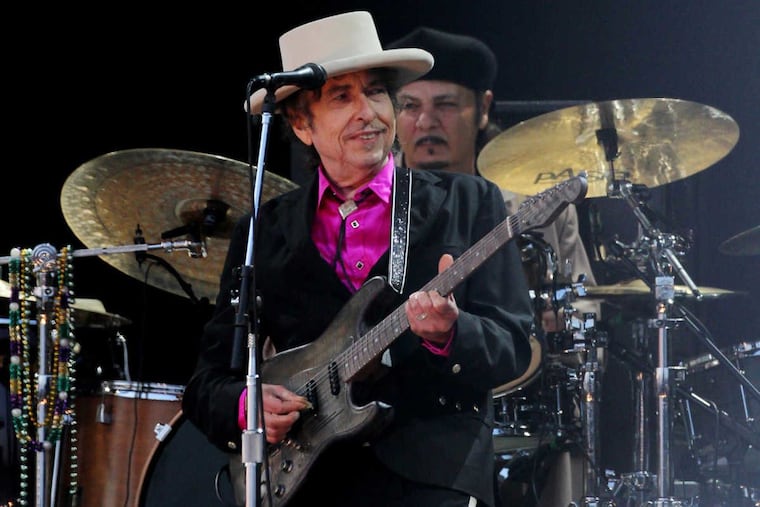Bob Dylan’s new ‘Rough and Rowdy Ways’ is his best in decades
'Rough and Rowdy Ways' is Bob Dylan's first album of new songs in eight years, and his best in much longer than that.

Bob Dylan has been plenty busy this past decade. It took a plague to bring his Never Ending Tour to a halt. (Were it not for the coronavirus pandemic, the grizzled bard and his band would be in Las Vegas this weekend, on his way to Wilkes-Barre on July 7.)
He released three consecutive albums of standards at mid-decade, interpreting Great American Songbook classics associated with Frank Sinatra in a not-so-dulcet voice. But what Dylan wasn’t doing is the one thing that the world’s been counting on him to do for more than half a century: put out new Bob Dylan songs.
The drought ends with Rough and Rowdy Ways (Columbia *** 1/2), Dylan’s playful, profound, and terrifically inspired first album of new material since Tempest in 2012. It’s his best recorded work since at least Love and Theft in 2001, if not going back even further to Time Out Of Mind in 1997.
Rough and Rowdy Ways borrows a title from Jimmie Rodgers, the blue-yodeling Father of Country Music, and the album is chock full of allusions to cultural and historical touchstones that Dylan pieces together in his own irascible vision.
The first signal that Dylan was creating again came in March with the release of “Murder Most Foul,” the 17-minute marathon that uses the assassination of John F. Kennedy to explore the mythology of the 1960s that Dylan remains central to, despite five decades trying to shake off being labeled the voice of his generation.
When it was released — and topped Billboard’s digital rock sales chart, making it the first No. 1 hit in Dylan’s career — one obsessive fan compiled a Spotify playlist of all the songs it referenced. There are 57 total, from the Beatles’ “I Want To Hold Your Hand” to the Montgomery Improvement Association’s gospel hymn “We Are Soldiers in the Army.”
» READ MORE: Bob Dylan played dodgeball in the Northeast and other stories from his half-century playing Philly
Not all of Rough and Rowdy Ways is as overstuffed with nods to the 79-year-old singer’s jukebox favorites, but the album does have the air of a late-night rumination that draws from a lifetime of accrued cultural touchstones.
“Goodbye Jimmy Reed” is a celebration of the great bluesman, in the tradition of Dylan showing respect for his forebears — as his did with previous masterworks like “Blind Willie McTell” and the tribute “High Water (for Charley Patton).”
Never one to be able to resist a rhyme, Dylan lets loose with some goofy, amusing ones here. On “My Own Version Of You,” he imagines creating a Frankenstein-like monster to replace a departed soul mate: “I’ll take the Scarface Pacino and Godfather Brando, mix it up in a tank and create a robot commando.”
But that sort of stream-of-conscious silliness mingles with profundity. In the same song, Dylan draws on Shakespeare’s Richard III and Hamlet, and asks “What would Julius Caesar do?”
And in a verse that begins, “You can bring it to St. Peter, you can bring it to Jerome / Bring it all the way over, bring it all the way home,” he’s excavating the past of another illustrious poet: Bob Dylan.
Rough and Rowdy Ways works so well because it’s both gently contemplative and bellicose. All the hours Dylan spent on the road singing Sinatra songs might not have struck many as the best use of his time. But turning himself into a hushed whisperer of saloon songs has aided him in tenderly rendering his own compositions, like the delicate “I’ve Made Up My Mind To Give Myself To You.”
» READ MORE: Album reviews: Fiona Apple is extraordinary again on the new ‘Fetch the Bolt Cutters’
Backed by his stellar road band and auxiliary musicians including Fiona Apple (!), Dylan is almost always at the forefront as the music shadows him. Of course, his voice has never been pretty and has diminished over the years, but his Rough and Rowdy singing is neither mannered nor corrosive. Nearing 80, he sounds better than he has in years.
Songs like “Black Rider” see the end of the road ahead. “Flowers are dying, like all things do,” he sings in “I Contain Multitudes,” going on to confide, “I sleep with life and death in the same bed.”
But throughout Rough and Rowdy Ways, Dylan is also boastful and combative. He’s ready to rumble, in battle-rap mode. In “Multitudes,” he declares “I sing the songs of experience like William Blake / I have no apologies to make.”
He really gets his dander up when stomping the blues. In “False Prophet,” he declares himself “First among equals, second to none,” and a soldier in a battle worth fighting: “The enemy of treason, an enemy of strife / the enemy of the unlived meaningless life.”
Rough and Rowdy Ways feels timely. “What are these dark days I see in this world so badly bent?” Dylan asks in “Crossing The Rubicon.”
I suspect, however, that Dylan’s 39th album would seem pertinent to the world it entered if it arrived 10 years ago or 20 years hence. It speaks to us in this moment, and will continue to as time passes. That’s what great art, and Bob Dylan, does.